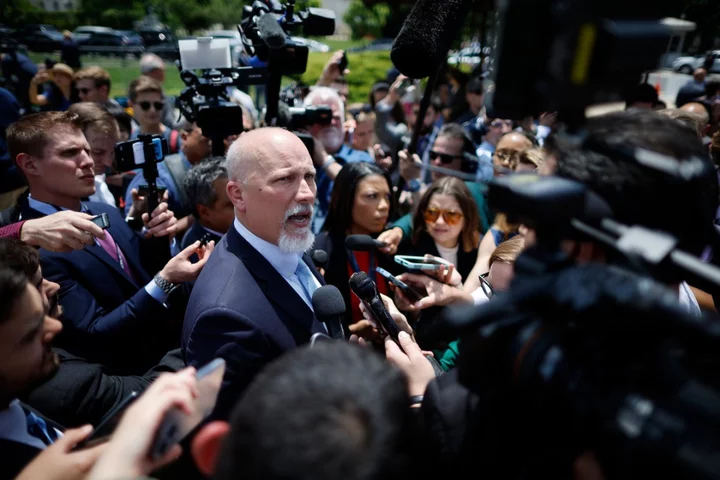
Debt limit agreement clears first hurdle despite Republican anger. Here’s what happens next
The bipartisan agreement to raise the debt limit cleared a key hurdle on Tuesday evening despite vehement criticism from many House Republicans. The House Rules Committee voted 7-6 to advance the legislation that codifies the bipartisan agreement struck between House Speaker Kevin McCarthy’s team and negotiators from President Joe Biden’s administration. The rule will now go to the full House floor before the agreement comes to a full House vote. The rule passed after an hours-long deliberation in the committee that included multiple amendment proposals. The vote comes as Treasury Secretary Janet Yellen has warned that the United States will be unable to satisfy its debt obligations come 5 June. The House of Representatives is set to vote But many House Republicans raised objections, including members of the House Freedom Caucus who had previously opposed Mr McCarthy’s bid for speaker in January. Rep Andy Biggs (R - AZ) told The Independent that Mr McCarthy’s deal with the White House was a repeat of his past behaviour. “When he was been in leadership for 13 years, it was not uncommon for him to be the point man to go negotiate a spending cap deal with the Democrats,” he said. Many Republicans criticised the fact that the legislation keeps in place Mr Biden’s student loan forgiveness, only claws back a small sliver of money meant to increase funding for the Internal Revenue Service and raises the debt limit until January 2025, after the 2024 presidential election. Rep Bob Good (R - VA) told The Independent that the bill symbolised a surrender from House Republican leadership. “We have literally come together and our leadership and their leadership and agreed on a Democrat bill,” Mr Good told The Independent. But many allies of Mr McCarthy also opposed the legislation. Rep Nancy Mace (R - SC), who voted for Mr McCarthy for speaker in January, announced her opposition to the bill. “Washington is, was and always will be lousy at responsibly spending your tax dollars,” she tweeted. “That won’t change unless we demand change.” Rep Chip Roy (R - TX) refuted the idea that conservatives would want the United States to default on its debt obligations. “The only person who would default in this town is Joe Biden unless Republicans default on the American dream by voting for this bad bill,” he said at a press conference. “That is why this group will oppose it, we will continue to fight it, today, tomorrow, and no matter what happens, there’s going to be a reckoning about what just occurred.” Mr Roy had tweeted on Monday that during the negotiations for the speakership, Republican leaders pledged that nothing would pass the Rules Committee without at least seven Republican votes and the committee would not allow for reporting out rules without unanimous Republican votes. During the negotiations, Mr Roy tried to stress his opposition and said why Republicans should oppose the bill. “We're not going to reduce spending through this deal. Unless we actually stand up and reduce spending it'll be on us to choose to,” he said during the hearing. “But this deal isn't going to reduce spending even though everybody's going around saying it will.” But some Republicans stressed that the agreement was the only one that could pass the House and Senate and end up on the president’s desk. “We only control one-half of one-third of government,” Rep Erin Houchin (R - IN) said. “There’s no better deal to be had.” Mr McCarthy expressed confidence in a press conference that he would have enough votes to raise the debt limit. “I’m not sure what in the bill people are concerned about,” he told reporters, saying it is the largest savings in congressional history. “We’re pulling money back for the hard-working taxpayers that are going to China. Are they opposed to work requirements for welfare?” On the Senate side, both Republican and Democratic leaders praised the agreement. “Congress will vote on legislation that locks in that important progress,” Senate Minority Leader Mitch McConnell (R - KY) said in remarks on the Senate floor. “Republicans have a tremendous opportunity to take on an existential challenge facing our economy and future generations of Americans. We have a chance to start bringing Washington Democrats’ reckless spending to heel.” Senate Majority Leader Chuck Schumer said the bill was a reasonable compromise. “Of course, nobody is getting everything they want – there is give on both sides – but this agreement is the responsible, prudent and very necessary way forward,” he said on the Senate floor. Mr Schumer said he would bring the bill up as quickly as possible for consideration before the default deadline on 5 June. Read More Biden ‘optimistic’ about McCarthy negotiations as AOC slams ‘dysfunctional’ debt ceiling system Debt ceiling deal reached between Biden and McCarthy Conservatives bark after the debt limit deal. Will they actually bite McCarthy? GOP chairman moves to hold FBI director Wray in contempt over Biden doc Utah Republican Chris Stewart planning to resign from Congress, AP source says Debt limit deal is in place, but budget deficit is still a multi-decade challenge for US government
2023-05-31 09:20

Elizabeth Holmes news – latest: Theranos founder surrenders to Texas prison to begin 11-year sentence
Elizabeth Holmes has reported to prison today to begin her 11-year sentence for the blood-testing scam at the heart of her start-up, Theranos. Wearing a beige sweater, jeans and sneakers, Elizabeth Holmes was directed into Federal Prison Camp in Bryan, Texas, by staff from the Federal Bureau of Prisons just minutes before a court-imposed deadline of 2pm on Tuesday. A federal appeals court rejected her bid to remain out of prison earlier this month while she attempts to overturn her January 2022 conviction on four felony counts of fraud and conspiracy. A delay was granted to give Holmes time to sort out several issues, including child care for her one-year-old son William and three-month-old daughter Invicta. Holmes had originally been ordered to begin her prison sentence on 27 April. The father of both children is William “Billy” Evans, whom she met after breaking up with her former romantic and business partner, Ramesh “Sunny,” Balwani, who began serving a nearly 13-year prison sentence last month in Southern California. Holmes spent the Memorial Day weekend near her home in San Diego before surrendering to authorities on 30 May. Read More Elizabeth Holmes surrenders to federal prison in Texas to begin 11-year sentence for Theranos scandal Elizabeth Holmes prison: Everything we know about disgraced Theranos founder going to jail Who is Billy Evans, the husband of Theranos founder Elizabeth Holmes? Camp Bryan: What do we know about the prison holding Elizabeth Holmes? Selfless visionary or scheming grifter? Theranos founder Elizabeth Holmes sentenced to 11 years in prison
2023-05-31 02:21

Elizabeth Holmes surrenders to federal prison in Texas to begin 11-year sentence for Theranos scandal
Elizabeth Holmes has surrendered to a federal prison in Texas to begin her 11-year sentence over the Theranos scandal which rocked the high-flying tech world of Silicon Valley. The 39-year-old disgraced tech entrepreneur reported to Bryan, the minimum-security federal prison camp in Texas, on Tuesday after exhausting all remaining legal avenues to cling onto her freedom. Holmes was convicted in January 2022 of four counts of fraud and conspiracy for lying about the capabilities pf her biotech company’s blood testing technology and conning investors out of millions of dollars. She was sentenced to 11 years and three months in prison and ordered to pay $452m in restitution to investors – including $125m to media mogul Rupert Murdoch. Holmes had been given until 2pm local time to surrender to the prison camp where she will see out her 11-year sentence surrounded by other white-collar, non-violent female offenders. Her two children – two-year-old William and three-month-old Invicta – will be allowed to visit their mother in the facility. The prison camp, which runs a work-focused program where all inmates are required to hold a job for at least 90 days, is a marked difference from Holmes’ life years earlier when she was seen as the darling of Silicon Valley. The saga began two decades ago when Holmes dropped out of Stanford University in 2003 at the age of 19 to found Theranos. The blood lab company aimed to develop medical devices that could diagnose hundreds of diseases and medical conditions with just a pinprick of blood. Over the next 10 years, Theranos boasted about its capabilities to transform the healthcare industry and grew to a value of $9bn, attracting investments from the likes of Murdoch, former Education Secretary Betsy DeVos and the heirs to the Walmart fortune. The company amassed an influential board of directors including former presidential cabinet members George Shultz, Henry Kissinger and James Mattis. Holmes, meanwhile, was catapulted onto magazine covers and became heralded as the next Steve Jobs while her personal fortune reached $4.5bn. But the technology didn’t do close to what Holmes claimed it could. In 2018, Holmes – Theranos CEO and founder – and Ramesh “Sunny” Balwani – Theranos chief operating officer and Holmes’ live-in romantic partner – were both indicted on fraud charges and the company was dissolved. She was allowed out on bail and while awaiting trial – which was stalled due to the Covid-19 pandemic – Holmes became pregnant with her first child with her partner, hotel boss Billy Evans. She became pregnant with her second child following her conviction. During her trial, Holmes sought to paint a picture that she had simply been under the control of Balwani, 57, and that she never intended to mislead investors about the technology’s capabilities. The jury didn’t buy it and she was convicted of four counts, which could have landed her with up to 20 years’ prison time. Balwani was also convicted of 12 counts of fraud and conspiracy at his trial and was sentenced to 13 years in federal prison. He began serving his sentence in Southern California last month. Since her conviction, Holmes has fought to stay out of prison claiming that she was treated unfairly by prosecutors during trial and that she should be allowed to remain out of prison while she appeals the conviction. An appeals court denied her request and said she must report to prison where she can continue to appeal her conviction behind bars. She asked the judge that she be allowed to remain free through Memorial Day weekend so that she could sort out childcare for her two children, before surrendering to authorities on 30 May. Weeks before beginning her sentence, Holmes admitted that she had made “many mistakes” in a new interview with The New York Times. “I made so many mistakes and there was so much I didn’t know and understand, and I feel like when you do it wrong, it’s like you really internalise it in a deep way,” she said. Read More Elizabeth Holmes news – latest: Theranos founder to surrender to Texas prison today to begin 11-year sentence As Elizabeth Holmes heads to prison for fraud, questions remain about her motives Elizabeth Holmes requests May 30 as new date to report to prison after losing her bid to remain free
2023-05-31 01:55

Elizabeth Holmes prison: Everything we know about disgraced Theranos founder going to jail
Disgraced Theranos founder Elizabeth Holmes is about to begin her 11-year prison sentence after being found guilty of defrauding investors, including media mogul Rupert Murdoch, over fake claims about the company’s blood-testing capabilities. As well as being handed jail time over her role in misleading investors, Holmes was also ordered to pay $452m in restitution. Follow the latest updates live “This is a fraud case where an exciting venture went forward with great expectations and hope, only to be dashed by untruth, misrepresentations, hubris, and plain lies,” Judge Davila, presiding over the case, said before handing down the prison sentence to Holmes. “I suppose we step back and we look at this, and we think, what is the pathology of fraud? Is it the inability or the refusal to accept responsibility or express contrition in any way? Now, perhaps that is the cautionary tale that will go forward from this case.” Ahead of being sentenced, Holmes, who has long maintained she did not intend to defraud anyone, told the court: “I am devastated by my failings. “Every day for the past years I have felt deep pain for what people went through because I failed them. I regret my failings with every cell of my body.” Where will Holmes serve her sentence Holmes, who requested 18 months of house arrest as a punishment, will begin her sentence at Federal Prison Camp Bryan in Texas – an all-female facility 100 miles from Holmes’ hometown. The minimum security prison houses around 500 inmates, and runs a variety of programmes intended to prepare prisoners for life after incarceration, according to Camp Bryan’s handbook. Holmes’ day will begin at 6am, when inmates are woken up for meals and work; people failing to comply with the strict wakeup rules are subject to punishments. Inmates are then counted at five different times during the day, when they must assemble in specific areas (once again, punishments are doled out to those who are not present at these times). The prison features a study, game room, and work programmes that see all inmates take part in a six-week course on the importance of efficiency in the workplace before they are placed into a role – with some prisoners earning as little as $0.12 in some assignments. According to the handbook, “All designated inmates are required to develop a financial plan to meet their financial obligations”, which for Holmes will mean reparations of $452m. How will Holmes keep in touch with her family? Holmes is married to Billy Evans, and the pair have two children, William, 2, and newborn Invicta. She lives around 100 miles from her family, who will be permitted to visit at weekends. Inmates at Camp Bryan are also permitted to take part in video sessions with their friends and family, according to the handbook, as well as to send and receive text messages. Prior to beginning her sentence at Camp Bryan, Holmes spent the weekend with her husband and children at the beach.
2023-05-30 22:28
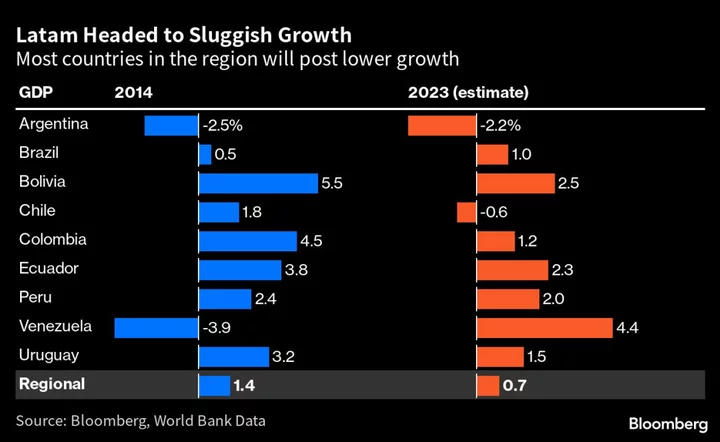
Lula’s Summit Brings Together Struggling South American Presidents
Brazil’s Luiz Inacio Lula da Silva is hosting his South American counterparts on Tuesday as he seeks to
2023-05-30 21:21

Malaysia Says 1MDB Fugitive Jho Low in Macau: Al Jazeera
Malaysia believes financier Low Taek Jho is hiding in Macau, along with others wanted in the multibillion ringgit
2023-05-30 15:17

Taiwan’s Lai Wants to Tell Xi Jinping to ‘Chill Out’ Over Dinner
Dinner with strangers can often be a little awkward, especially when your guest has threatened you with invasion.
2023-05-30 14:54

South Africa Paves Way for Immunity for BRICS Summit Attendees
South Africa’s government will provide diplomatic immunity to attendees of two meetings of officials from the BRICS group
2023-05-30 13:52
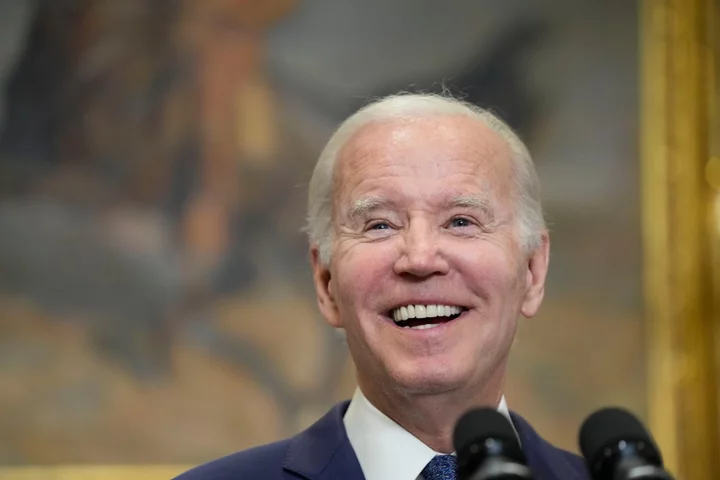
Takeaways on debt ceiling: McCarthy's balancing act, Biden's choice and the challenges ahead
It’s a deal no one in Washington claims to really like. But after weeks of negotiations, President Joe Biden and House Speaker Kevin McCarthy have struck an agreement to raise the debt ceiling and avert a potentially devastating government default. The stakes are high for both men — and now each will have to persuade lawmakers in their parties to vote for it. Treasury Secretary Janet Yellen said last week that the United States could run out of cash to pay the bills and default on its obligations if the debt ceiling is not raised by June 5. The ultimate agreement, hammered out by Biden, McCarthy and a small group of their deputies, is a two-year budget deal that would essentially hold spending flat for 2024, while boosting it for defense and veterans, and capping increases at 1% for 2025. It would suspend the debt limit until January 2025, after the next presidential election. Republicans had insisted on reducing spending and had passed their own bill with much larger cuts last month. The package would also make policy tweaks, including by adding work requirements for some food aid recipients and streamlining an environmental law that Republicans say has made it harder to build energy projects. Takeaways from the deal, and from the negotiations that led up to it: McCARTHY’S DELICATE BALANCING ACT Ever since McCarthy won the House speakership on the 15th ballot in January, it was clear that the debt ceiling negotiations would be his first and perhaps biggest test. Known more for strategy than policy, McCarthy has had a challenge that seemed almost insurmountable, with a narrow majority and a sizable group of hard-right conservatives certain to oppose anything he negotiated with Biden. And he could still find himself in the middle of a crisis if too many in his caucus revolt when the House votes on the package this week. Through it all, the Californian has exhibited his typical laid-back vibe, projecting confidence about the bill and its success. He said Sunday that he will win a majority of Republicans on the bill and some Democrats. In a conference call on Saturday night, McCarthy said, more than 95 percent of the members in his conference “were overwhelmingly excited about what they see.” But some House Republicans were publicly slamming the deal, arguing it did too little to cut the deficit. Rep. Dan Bishop of North Carolina tweeted a vomit emoji, complaining that some Republicans on the call were praising the speaker for getting what he said is “almost zippo in exchange” for the debt-ceiling hike. BIDEN’S RELUCTANT COMPROMISE For months, Biden and his aides had a mantra: There would be no negotiation on the debt limit. But then he negotiated anyway. It’s not where Biden, a veteran of the nasty 2011 debt-limit battle that saw the nation’s credit rating downgraded for the first time in history, wanted to be. But it was a likely scenario — with a Republican-controlled House that had made it clear from the start that it would not raise the borrowing authority under a Democratic president without extracting spending curbs or other policy concessions. There was no way Biden, who is running for re-election next year, would want a historic default on his watch. Biden has continued to insist that he was negotiating on the budget, not the debt ceiling. But pushed by a reporter Sunday evening who noted that was precisely what Republicans were seeking in exchange for lifting the debt limit, the president seemed to break from his talking point. “Sure, yeah,” Biden said, chuckling slightly. “Can you think of an alternative?” Now he will have to sell it to House Democrats, who must vote for it in big enough numbers to make up for defecting Republicans. Many progressive members in the House have appeared skeptical of the deal, but they remained mostly quiet over the weekend as they waited for more details. But the deal won early praise from another key Democratic group. The New Democrat Coalition, which has roughly 100 members, praised Biden as having negotiated “a viable, bipartisan solution to end this crisis.” LONG-SOUGHT GOP POLICY Republicans were able to win some policy changes they have sought for years, however modest, including on food aid. The bill would raise the age limit for existing work requirements in the Supplemental Nutrition Assistance Program, also known as food stamps. It would also create a new agency to develop and streamline environmental reviews that Republicans have complained about for decades. The new work requirements for able-bodied SNAP recipients without dependents would phase in by 2025 and expire by 2030. And a provision pushed by Biden would take some vulnerable recipients — like veterans and the homeless — off work requirements entirely. But Republicans made clear that pushing more people to work in exchange for government benefits was a major victory for them, even if mostly symbolic. The bill also would amend the National Environmental Policy Act and designate “a single lead agency” to develop environmental reviews, in hopes of streamlining the process. Republicans had hoped for a much broader permitting package that would make it easier to build and develop energy projects. But Louisiana Rep. Garret Graves, a McCarthy ally who was one of the negotiators, said the bill brings “transformational changes into the permitting and environmental review process” for the first time in four decades. SENATE QUIET, WAITING TO CLOSE McCarthy has said the House will vote on the package Wednesday. If passed, it will then head to the Democratic-led Senate where leaders will have to get agreement from all 100 members to speed up the process and avert a default by next Monday. The White House briefed Democratic senators Sunday and McCarthy briefed Republicans. But most senators remained quiet on the deal as they waited for the full text and to see if McCarthy can navigate it through the House. Senate Majority Leader Chuck Schumer, D-N.Y., and Senate Republican Leader Mitch McConnell of Kentucky cut themselves out of the negotiating process early on, saying it should be a negotiation between the White House and McCarthy. McConnell issued a statement supporting the legislation on Sunday but some in his caucus have criticized it. The two leaders will have to navigate any potential objections over the coming week as they seek to win full support to move quickly on the deal. “With Republicans like these, who needs Democrats?” tweeted Utah Sen. Mike Lee on Saturday, aligning himself with the House Republicans who say the deal is not conservative enough. Read More Ukraine war’s heaviest fight rages in east - follow live Charity boss speaks out over ‘traumatic’ encounter with royal aide Trump's welcome of Scott into 2024 race shows his calculus: The more GOP rivals, the better for him Stock market today: Asian markets mostly higher after Biden-McCarthy deal on US debt What’s in the cliffhanger deal struck by Biden and McCarthy to raise the debt limit?
2023-05-29 12:47

What’s in the cliffhanger deal struck by Biden and McCarthy to raise the debt limit?
Weeks of sniping back-and-forth between the White House and the Republican majority in the House of Representatives has finally yielded a deal: America will not default on its debt obligations, should Congress act and pass the legislation before Thursday. On Saturday, House Speaker Kevin McCarthy and Joe Biden announced the end of negotiations and the agreement upon a deal late into the evening, with the text of the legislation itself soon to follow. The new compromise both touches on Republican priorities while also safeguarding Joe Biden’s legislative accomplishments. But it comes after weeks of bitter fighting. Republicans accused the White House and congressional Democrats of out-of-control spending, ignoring their rivals’s derisive reminders about the debt incurred by a GOP-led tax cut passed in 2017 that largely benefited wealthier Americans. Democrats, meanwhile, blamed Republicans for holding the country’s credit rating and ability to pay its loans hostage, and for seeking cuts to social welfare programs like food assistance for needy families. As we inch closer to Thursday’s deadline, let’s take a look at what leaders in Washington have come up with to break the deadlock. No more debt drama (for now) The first and most significant achievement of this deal: it raises the debt ceiling through the end of 2024. That guarantees the GOP won’t be able to wage a fight over the issue again, particularly as the presidential campaign season heats up later this year and into the next. Any debt ceiling battle during campaign season, particularly in the summer or fall of 2024, would take Joe Biden off the campaign trail and put his focus firmly on Washington at a time when either of his likely general election opponents, Donald Trump and Ron DeSantis, would be free to continue their politicking. In total, the deal calls for raising America’s debt limit by $4 trillion. Signing away that leverage for the next year is already proving to be one of the toughest pills for congressional conservatives in both the House and Senate to swallow, especially given the lack of other major concessions in the pending legislation. Spending caps The GOP’s big win in the negotiating process, this legislation is set to freeze federal spending at the current level, with the exception of military funding, through 2024. And growth of that spending will be capped at 1 per cent if Congress cannot agree upon a stopgap spending deal in January of 2025. This is a significant restriction for the federal government over the next year, and notably puts in place much stricter spending limits than members of Congress agreed to during the last debt limit fight in 2019. The language allowing for defence spending to increase while domestic programmes face a spending freeze is already irking progressives, who have long argued that the US military’s bloated budget should be at the top of the list for reforms. Caps set by this compromise are simultaneously the biggest victory for Republicans as well as their failure; while the spending caps are certainly more than what Democrats were demanding, they also eliminate the possibility of Republicans using the debt ceiling to make real cuts to programmes already implemented by the Biden administration as part of the Inflation Reduction Act and other legislation. That means that Mr Biden’s 2021-2022 legislative agenda will remain largely intact, despite demands by conservatives to roll back huge parts of it, like efforts to forgive student loans or expand green energy production. Work requirements for food stamps One of the GOP’s efforts to stem the tide of federal spending is centred around the issue of providing food assistance to low-income families. The new legislation is set to expand work requirements for the SNAP programme from the current age cap of 49 to a new cap of 54, meaning that Americans within that age bracket will have to prove employment to receive benefits. The issue may seem oddly specific for Republicans to hold up America’s ability to pay its debts upon, but tightening the restrictions fo federal assistance has long been a target of the GOP, and originally the party wanted to expand those work requirements to Medicaid as well. The new work requirements will sunset in 2030, unless extended before then by a GOP Congress. IRS funding halted The other specific ask that Republicans managed to secure in their compromise with the White House was a halt, at least in part, to a plan to fund new hiring initiatives at the Internal Revenue Service (IRS), America’s tax collection agency. The beleaguered agency was set to receive more funding for agents that the federal government said were to assist taxpayers with filing issues and shore up the IRS’s capabilities; Republicans painted the issue instead as an effort to hire an army of IRS auditors to go after taxpayers for suspected fraud, a non-starter for the party that has long sought, particularly among its conservative wing, to diminish the power and capabilities of both the IRS and other federal agencies. But some conservatives are already complaining that the cuts aren’t enough. Congressman Chip Roy exclaimed angrily after the deal was announced that “98%” of the funding for the expansion of the IRS’s services would still go through. Covid aid The deal has one more minor win for Republicans — a provision to return Covid aid funding that has yet to be appropriated. Millions of dollars in this aid still remains unspent by the federal government, though Democrats have used it thus far to fund a number of federal health programmes which they warn could face cuts if the aid is rolled back entirely. Read More Debt ceiling agreement gets thumbs up from biz groups, jeers from some on political right President attends 2nd grandchild's graduation as daughter of Biden's late son leaves high school Democrats look set to back debt limit deal – while right-wing threatens to blow it up AP News Digest 8:40 a.m. Debt-ceiling deal: What's in and what's out of the agreement to avert US default Asylum-seekers say joy over end of Title 42 turns to anguish induced by new US rules
2023-05-29 05:46
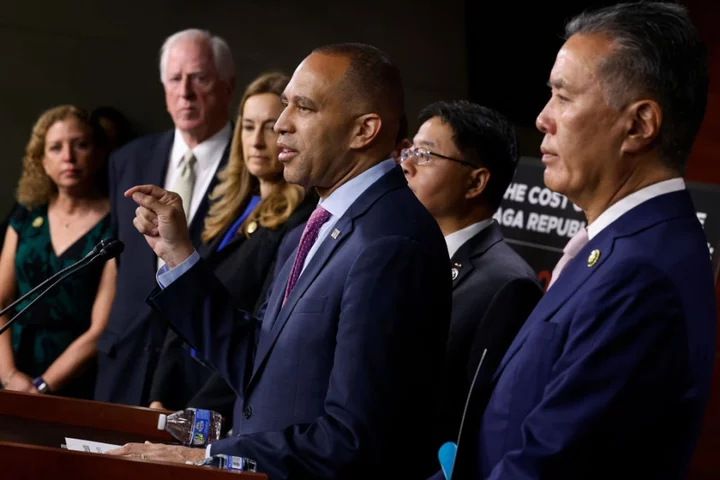
Democrats look set to back 11th hour debt ceiling deal – while GOP right-wingers threaten to blow it up
House Speaker Hakeem Jeffries sounded confident that Congress would vote to avert a default on the US’s obligations on Sunday, hours after news broke that the White House had reached a deal with Republican leadership to raise the debt ceiling. The “agreement in principle” was announced Saturday evening after much of the House of Representatives and Senate had left for the Memorial Day weekend. A handful remained in Washington to continue negotiations ahead of the deadline; the US Treasure Department estimates that the federal government’s ability to pay its debts will be in question come 1 June — this Thursday. Mr Jeffries spoke on CBS’s Face the Nation on Sunday. While he cautioned that he had not seen the actual text of the bill, which is reportedly set to cap funding for the US government (except for the military) through 2024, he offered a simple “yes” when asked directly if he could guarantee that the US would avert default. It’s a statement that will likely mean a sigh of relief for those Americans worried about the effects that a credit downgrade would have on the US economy, though that remains a possibility thanks to the toxic partisanship that brought the US to this point in the first place, but also one that may frustrate progressives and other Democrats who may see the development as Democrats giving in to the GOP’s demands. The deal does stave off further debt ceiling negotiations until 2025, but many on the left simply wish to do away with the limit altogether. And there’s already signs that many on the conservative right do not like the deal, with some even calling any legislation that raises the debt limit a non-starter. Their opposition within the GOP’s slim House majority necessitates votes from Democrats to pass this deal or any other. More follows...
2023-05-28 23:55
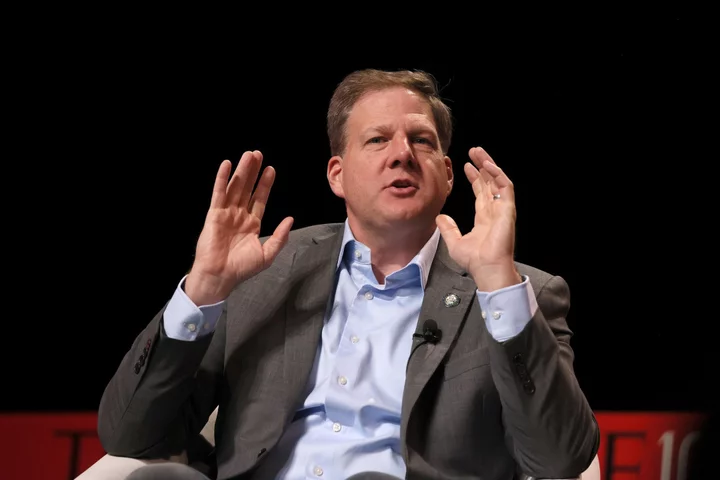
Sununu to Decide About 2024 Presidential Run in About One Week
New Hampshire Governor Chris Sununu, a persistent critic of former President Donald Trump, said he plans to decide
2023-05-28 22:59
You Might Like...
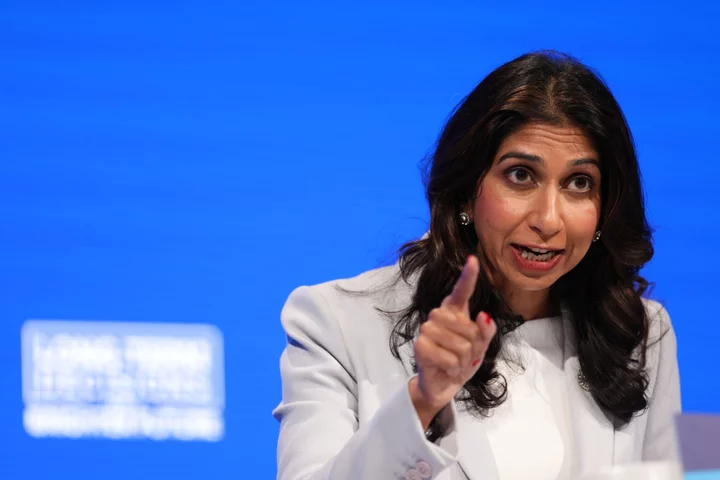
Fired Braverman Accuses UK’s Sunak of Betrayal, Broken Promises

Macau Shutters All Casinos as Typhoon Saola Hits Gambling Hub

EU Reaches Initial Agreement on Blueprint for China Relations

Musk Says Biden’s Call for More Taxes on Rich Won’t See ‘Action’

Messi Sends Ticket Prices to $10,000 for New York Red Bulls Game

Elizabeth Holmes prison: Everything we know about disgraced Theranos founder going to jail

Switzerland’s Thriving Russian Spy Hub Draws Scrutiny, NZZ Says
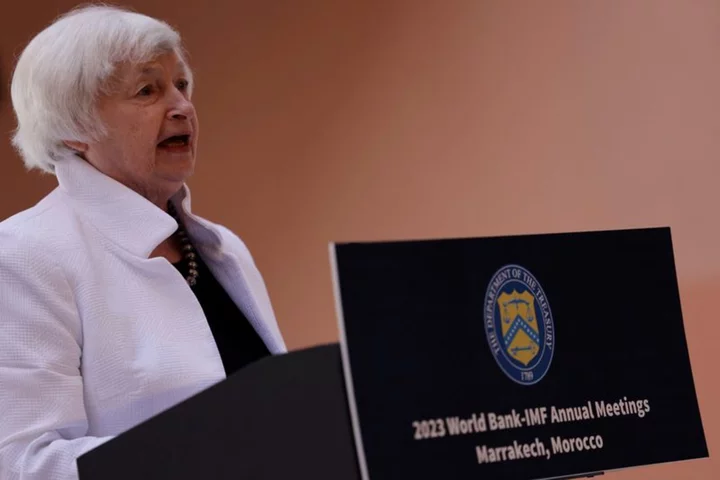
Yellen sticks to view U.S. economy headed for soft landing
